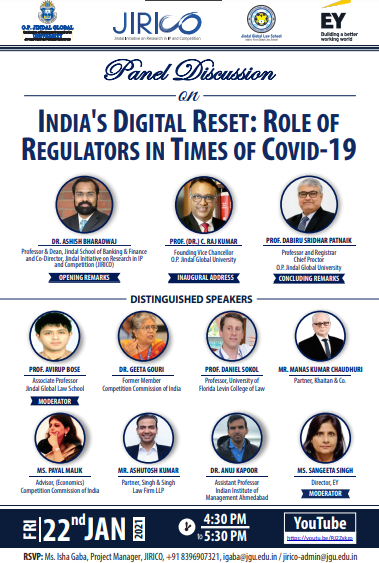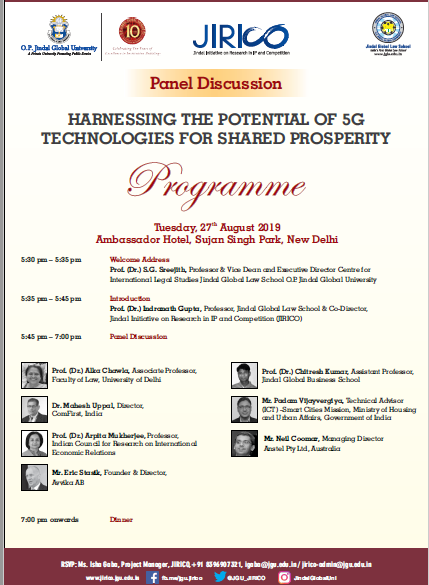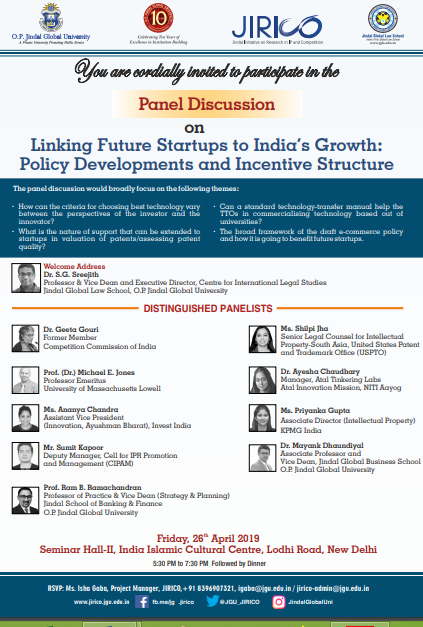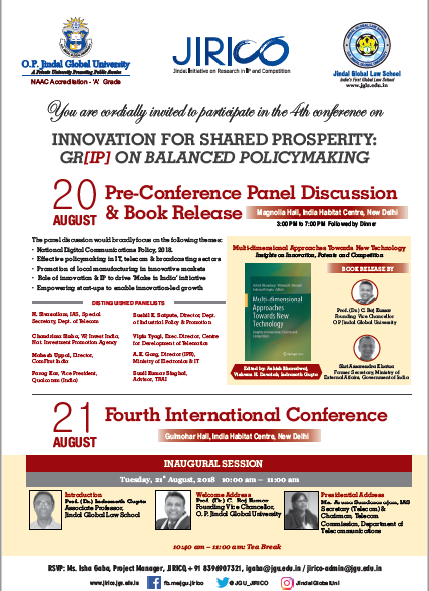Jindal Initiative on Research in IP and Competition
Panel Discussions
JIRICO Pre- Conference Roundtable: Readying India’s Antitrust for its Digital Economy
October 6th, 2023, in New Delhi

India is one of the fastest-growing digital economies in the world. With a large population of 1.4 billion, 1.3 billion telecom subscribers, 900 million internet subscribers and nearly 500 million smartphone users, a few countries in the world are experimenting with digital solutions that can match India’s scale. A 2019 study by the ‘Ministry of Electronics and Information Technology’ estimated the size of India’s digital economy at US$200 billion in 2019, which is expected to rise to US$500 billion by 2025. Furthermore, as per the Reserve Bank of India’s estimates, India’s digital economy exhibited a growth rate of 15.6% over the period 2011 to 2019, which was 2.4 times the growth of the Indian economy.
Commemorative Event
on
Innovation for Shared Prosperity: Celebrating 110 years of India’s Tryst with Patents
The year 2022 marks 110th anniversary of India’s tryst with patents. Patents have been serving as the engine and wings of technological innovation in India. The IPO was established to administer the Indian law of Patents, Designs, and Trademarks. Over the past 110 years, the intellectual property rights (IPR) regime in the country has witnessed transformations in our approach to IPRs, our vision for a technology-led society, and our contribution to the global innovation landscape. The IPO has confronted several technological, legal, administrative, regulatory, and policy challenges from stakeholders in and outside India. It has demonstrated not only foresight in adapting its functioning but also a global approach towards global IP policy and global innovation system.

India's Digital Reset: Role of Regulators in Times of COVID-19

C0VID-19 has reset India’s march towards a $1 trillion digital economy by 2025. While digital startups concentrating on travel marketplaces, cab hailing, entertainment etc. have been adversely affected to a large extent, under the new normal, sectors such as online learning and food delivery have done much better than the rest in terms of business and funding. Relatively newer lines of start-ups such as online pharmacy and online payments have also attracted investors.
Panel Discussion on India's Digital Reset: Role of Regulators In the Times of Covid-19
January 22, 2021
COVID-19 has reset India’s march towards a $1 trillion digital economy by 2025. While digital start-ups concentrating on travel marketplaces, cab hailing, entertainment etc. have been adversely affected to a large extent, under the new normal, sectors such as online learning and food delivery have done much better than the rest in terms of business and funding. The Government has intensified its focus on the digital economy. It introduced several policies, including the National Policy on Electronics (NPE) and the National Policy on Software Products (NPSP) earlier in 2019. Further, the Government aimed to boost the domestic digital markets, building a comprehensive digital manufacturing and research and development (R&D) ecosystem.

Harnessing the Potential of 5G Technologies for Shared Prosperity
New Delhi
August 27, 2019

With the proliferation of product and services based on Internet of Things, 5G, Artificial Intelligence (AI) and machine learning, the focus is being increasingly shifted to bringing in more transparency and clarity. With the Fourth Industrial Revolution ready to change the dynamics of technology around the world, concerns around managing data, securing patents and competing in a global market have come in the forefront.
JIRICO organised a panel discussion in New Delhi on August 27, 2019 on Harnessing the Potential of 5G Technologies for Shared Prosperity. The discussion was essentially aimed at advancing this futuristic policy dialogue in line with the global agenda on the same.
Linking Future Startups to India’s Growth: Policy Developments and Incentive Structure
New Delhi
April 26, 2019
The government of India has introduced the Startup India Scheme to help the startup businesses in India. The Scheme promotes innovation and provides the startups in India with recognition, ease of setting up of business, incentives in the form of tax exemptions, simplified application filing processes, reduction in costs for patent filling, funding support, expert guidance and incubation support. The Startup India Scheme runs parallel to several initiatives taken up by the government like Digital India, Invest India, Make in India and the draft National Policy on e-Commerce. JIRICO conducted a panel discussion in New Delhi on April 26, 2019 on Linking Future Startups to India’s Growth: Policy Developments and Incentive Structure to discuss on steps to protect and promote startup innovation and creativity with policy and incentives.

Innovation For Shared Prosperity: GR[IP] on Balanced Policy Making
New Delhi
August 20, 2018

JIRICO held a Pre-Conference Panel Discussion on 20 August 2018, a day before its 4th International Conference on Innovation for Shared Prosperity: GR[IP] on Balanced Policymaking, held during August
20-21, 2018 that focused on the need for balanced policymaking in the areas of intellectual property rights and antitrust to promote technological innovation. The panel discussion would broadly focus on these themes: (i) National Digital Communications Policy, 2018; (ii) Effective policymaking in IT, telecom & broadcasting sectors; (iii) Promotion of local manufacturing in innovative markets; (iv) Role of innovation & IP to drive ‘Make in India’ initiative; and (v) Empowering start-ups to enable innovation-led growth.
FOLLOW US ON SOCIAL MEDIA:
